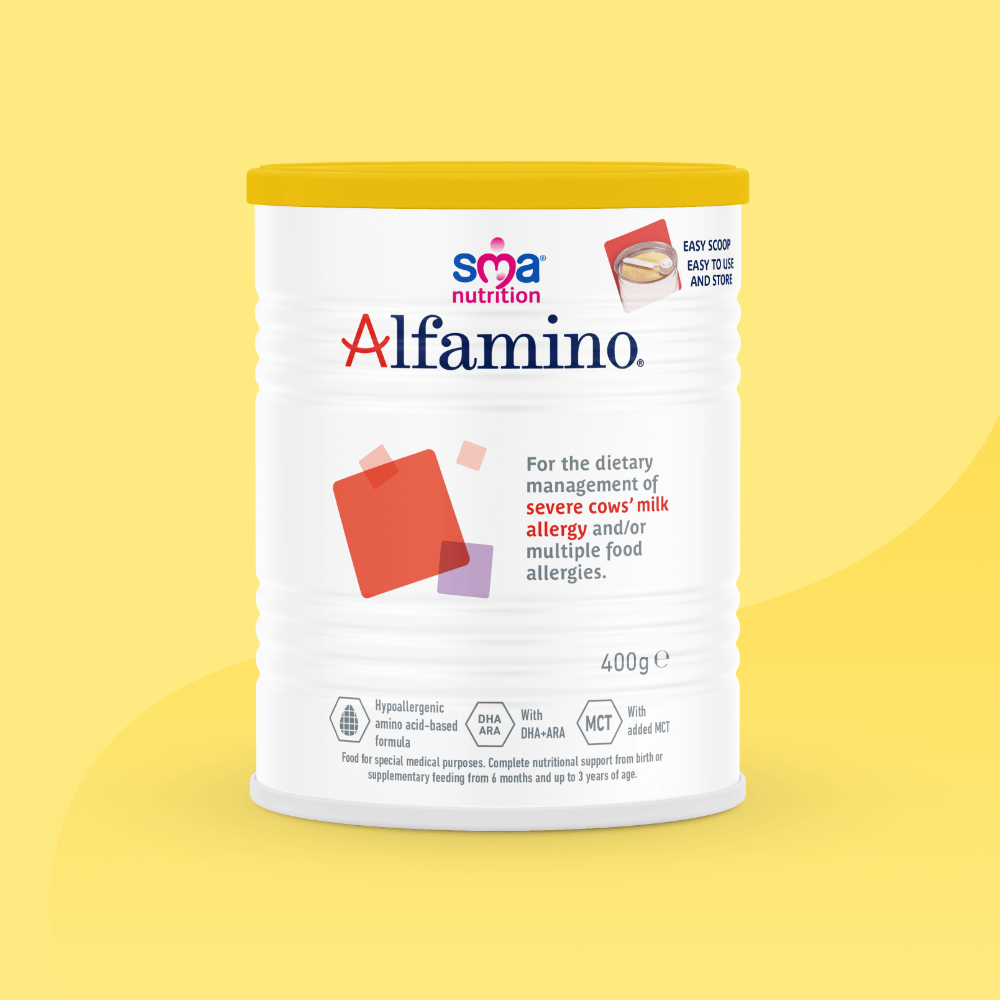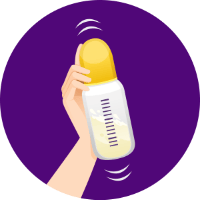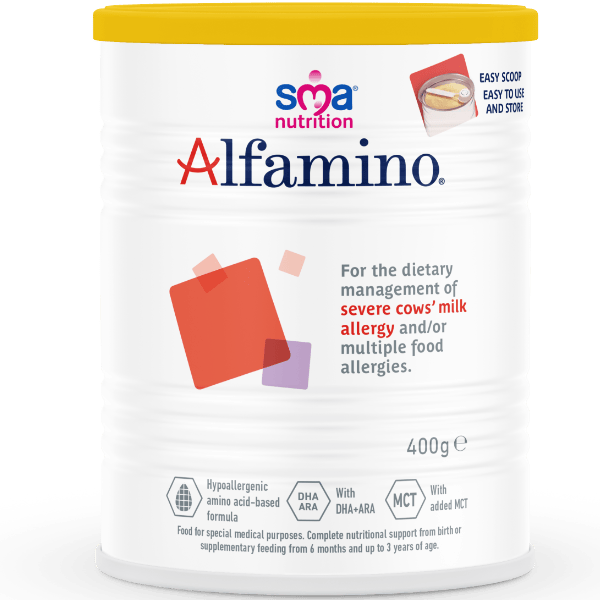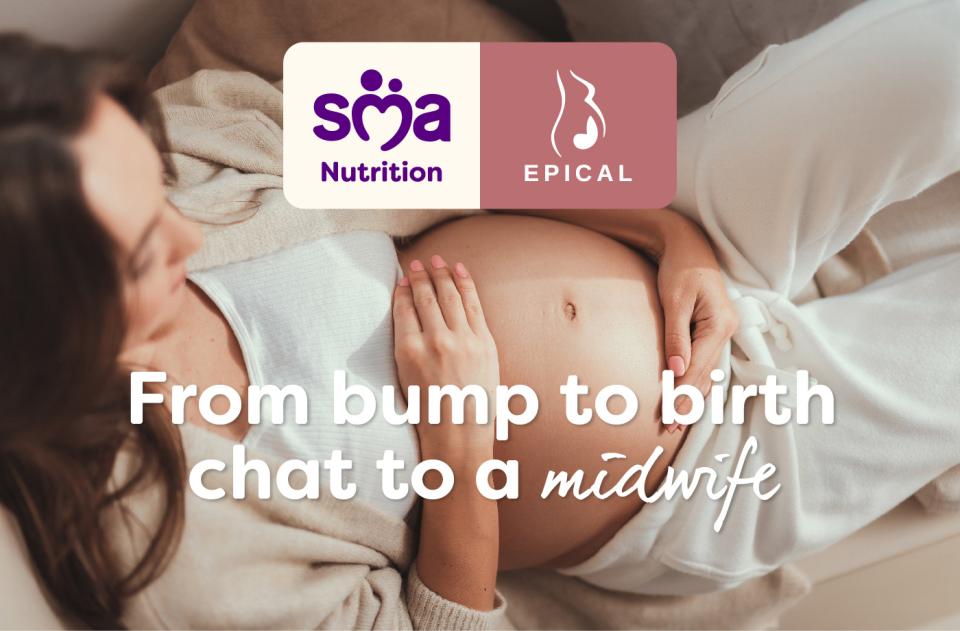SMA® Alfamino® Formula Powder - 400g
Infant food for special medical purposes, intended for the dietary management of severe/complex symptoms of cows’ milk protein allergy (CMPA). Complete nutritional support from birth or supplementary feeding from 6 months and up to 3 years of age. This formula must be used under medical supervision.
Why SMA® Alfamino® Formula Powder?
SMA® Nutrition has been pioneering infant nutrition since 1919, with over 100 years of expertise our dedicated team are committed to understanding the unique nutritional needs of babies with allergies. Our experts have created SMA® Alfamino® formula, an amino acid based, hypoallergenic specialist infant food for special medical purposes. It is for the dietary management of babies with severe cows’ milk protein allergy (CMPA), multiple food allergies and other conditions where an amino acid formula is recommended. It can be used as the sole source of nutrition from birth or for supplementary feeding from 6 months up to 3 years of age. Must be used under medical supervision.
Pioneering Care and Nutrition
Our dedicated careline team, including a former nurse and midwife, supported by dietitians and nutritionists, are on hand 24/7 to provide round-the-clock support when you need it most. Giving you the confidence to savour those special moments together.
What is Cows’ Milk Protein Allergy (CMPA)?
Cows' milk protein allergy (CMPA), also known as cows' milk allergy (CMA), is one of the most common food allergies in babies and young children. CMPA is a type of milk allergy where a baby’s immune system responds to the proteins found in cows’ milk, causing the baby to have allergic symptoms.
There are many symptoms associated with CMPA, but it can be easily managed with the correct diet, so getting a diagnosis is very important. The good news is that the vast majority of children who are allergic to cows' milk will outgrow this by the time they are 5 years old.
How to prepare your baby's feed
Whilst this product is made under strict hygienic conditions, it is not sterile. Failure to follow instructions may make your baby ill.
Sustainability
Caring for babies also means caring for the world they will inherit from us!

Steel can, foil and protective lid recyclable

Scoop and lid widely recycled, check your postcode to see if they are recycled in your area.
Together, let us help care for the environment.
SMA® Alfamino® Formula
400g powder
Easy open lid. Scoop can be stored in suspension inside the can. Use product within 3 weeks of opening. Approximately 90 scoops per can.
Glucose syrup, vegetable oils (sunflower, rapeseed, structured palm oil), amino acids (L-Lysine, L-Leucine, L-Proline, L-Glutamine, L-Arginine, L-Valine, Glycine, L-Isoleucine, L-Threonine, L-Serine, L-Phenylalanine, L-Tyrosine, L-Aspartic Acid, L-Histidine, L-Alanine, L-Cystine, Magnesium L-Aspartate, L-Tryptophan, L-Methionine), MCT, starch, minerals (calcium glycerophosphate, potassium chloride, sodium citrate, calcium citrate, potassium citrate, sodium phosphate, magnesium oxide, ferrous sulphate, zinc sulphate, copper sulphate, potassium iodide, manganese sulphate, sodium selenate), emulsifier (E472c), Mortierella alpina oil (ARA), oil from Schizochytrium sp. (DHA), choline bitartrate, vitamins (C, E, niacin, pantothenic acid, riboflavin, A, thiamin, B6, folic acid, K, D, biotin, B12), acidity regulator (E330), taurine, inositol, L-Carnitine.
| Nutritional information per 100 ml prepared feed | ||||
|---|---|---|---|---|
| Nutritional information | ||||
| Typical values | ||||
| Energy | 278 kJ 66 kcal | |||
| Fat | 3.3 g | |||
| of which, saturates | 1.1 g | |||
| of which MCT | 0.80 g | |||
| of which, monounsaturates | 1.2 g | |||
| of which, polyunsaturates | 0.69 g | |||
| Omega 3: | ||||
| α-linolenic acid (ALA) | 53 mg | |||
| Docosahexaenoic Acid (DHA) | 18 mg | |||
| Omega 6: | ||||
| Linoleic Acid (LA) | 532 mg | |||
| Arachidonic Acid (AA) | 18 mg | |||
| Carbohydrate | 7.5 g | |||
| of which, sugars | 0.53 g | |||
| Protein | 1.8 g | |||
| Salt | 0.065 g | |||
| Nutritional information per 100 ml prepared feed | ||||
|---|---|---|---|---|
| Vitamins | ||||
| Typical values | ||||
| Vitamins | ||||
| Vitamin A | 66 µg | |||
| Vitamin D | 1.7 µg | |||
| Vitamin K | 6.0 µg | |||
| Vitamin C | 11 mg | |||
| Vitamin E | 1.5 mg | |||
| Thiamin | 0.068 mg | |||
| Riboflavin | 0.13 mg | |||
| Niacin | 0.93/1.6 mg/mg NE | |||
| Vitamin B6 | 0.053 mg | |||
| Folic Acid/Folate (DFE)* | 10/17 µg | |||
| Vitamin B12 | 0.20 µg | |||
| Biotin | 1.6 µg | |||
| Pantothenic Acid | 0.44 mg | |||
| NE = Niacin Equivalent DFE = Dietary Folate Equivalent | ||||
| Nutritional information per 100 ml prepared feed | ||||
|---|---|---|---|---|
| Minerals | ||||
| Typical values | ||||
| Minerals | ||||
| Sodium | 26 mg | |||
| 1.1 mmol | ||||
| Potassium | 76 mg | |||
| 2 mmol | ||||
| Chloride | 56 mg | |||
| 2.0 mmol | ||||
| Calcium | 70 mg | |||
| 2.0 mmol | ||||
| Phosphorus | 47 mg | |||
| Phosphate | 1.5 mmol | |||
| Magnesium | 6.0 mg | |||
| 0.2 mmol | ||||
| Iron | 0.66 mg | |||
| Zinc | 0.66 mg | |||
| Copper | 0.057 mg | |||
| Manganese | 0.009 mg | |||
| Fluoride | - mg | |||
| Selenium | 3.4 µg | |||
| Chromium | - µg | |||
| Molybdenum | - µg | |||
| Iodine | 15 µg | |||
| Nutritional information per 100 ml prepared feed | ||||
|---|---|---|---|---|
| Others | ||||
| Typical values | ||||
| Others | ||||
| Taurine | 5.3 mg | |||
| L-Carnitine | 1.1 mg | |||
| Choline | 19 mg | |||
| Inositol | 4.7 mg | |||
Feeding guide birth – 12 months
| Approx. age of baby | Preparation for single feeds | Cooled, freshly boiled water | Feeds in 24 hours |
|---|---|---|---|
|
|||
| Level scoops* | ml | ||
| 1 – 2 weeks | 3 | 90 | 6 |
| 3 – 4 weeks | 4 | 120 | 5 |
| 2nd month | 5 | 150 | 5 |
| 3-4 months | 6 | 180 | 5 |
| 5-6 months | 7 | 210 | 5 |
| From 7th month** | 7 | 210 | 3-4 |
| Approx. age of baby | Preparation for single feeds | Cooled, freshly boiled water | Feeds in 24 hrs |
|---|---|---|---|
|
|||
| Level scoops* | fl. oz. (approx) | ||
| 1 – 2 weeks | 3 | 3 | 6 |
| 3 – 4 weeks | 4 | 4 | 5 |
| 2nd month | 5 | 5 | 5 |
| 3-4 months | 6 | 6 | 5 |
| 5-6 months | 7 | 7 | 5 |
| From 7th month** | 7 | 7 | 3-4 |
*Note: Use only the enclosed scoop (4.4g)
**A healthcare professional should be consulted before introducing other food to a baby's diet
This table is a guide only; your baby may need more or less than the volumes stated. If you require more advice, consult your healthcare professional. Remember to feed your baby on demand. Mix 1 scoop of powder to 30 ml (approx. 1 fl. oz.) of water.
Approx. 90 scoops per can. 1 scoop = 4.4 g.
- Do not add any extra powder or water to make feeds stronger or weaker and do not press powder into the scoop. Using too much or too little powder can make a baby ill.
- We recommend preparing each feed in individual bottles when required, feed immediately.
- For hygiene reasons, discard unfinished feed in the bottle as soon as possible.
- Always hold the baby while feeding. Never leave the baby alone during feeding as there is a risk they might choke.
- Do not alter or add to formulae unless medically directed.
- Do not warm feeds in a microwave, hot spots may occur and cause scalding.
Important notice
Breast milk is best for babies and breastfeeding should continue for as long as possible. This product must be used under medical supervision. SMA® Alfamino® is a specialist infant formula intended for the dietary management of infants with severe cows’ milk allergy, multiple food allergies and other conditions where an amino acid formula is recommended. It is a food for special medical purposes and must only be used under strict medical supervision and after full consideration of the feeding options available, including breastfeeding. Suitable as a sole source of nutrition from birth or supplementary feeding from 6 months and up to 3 years of age.



















